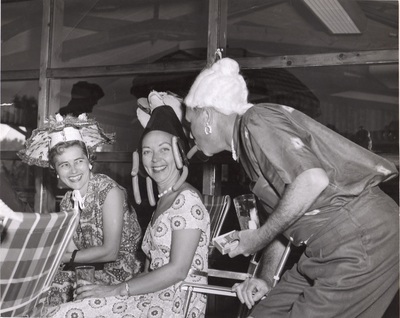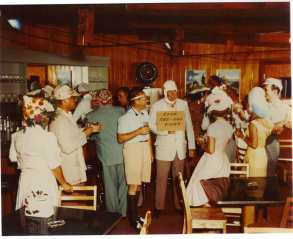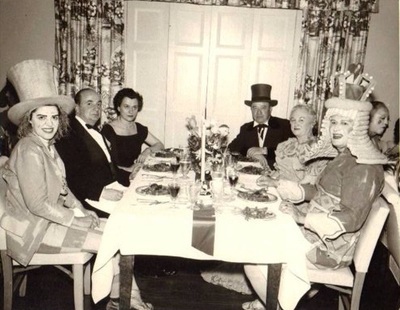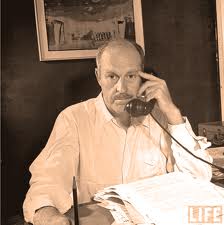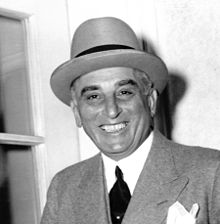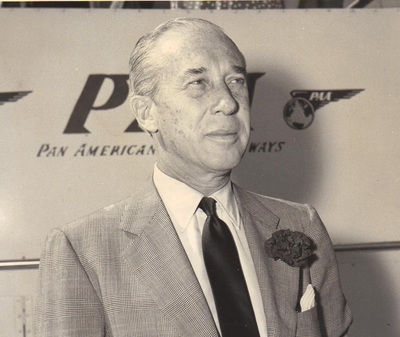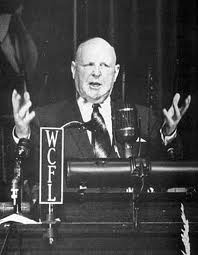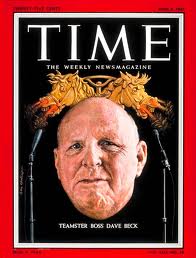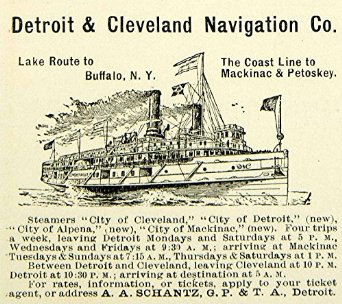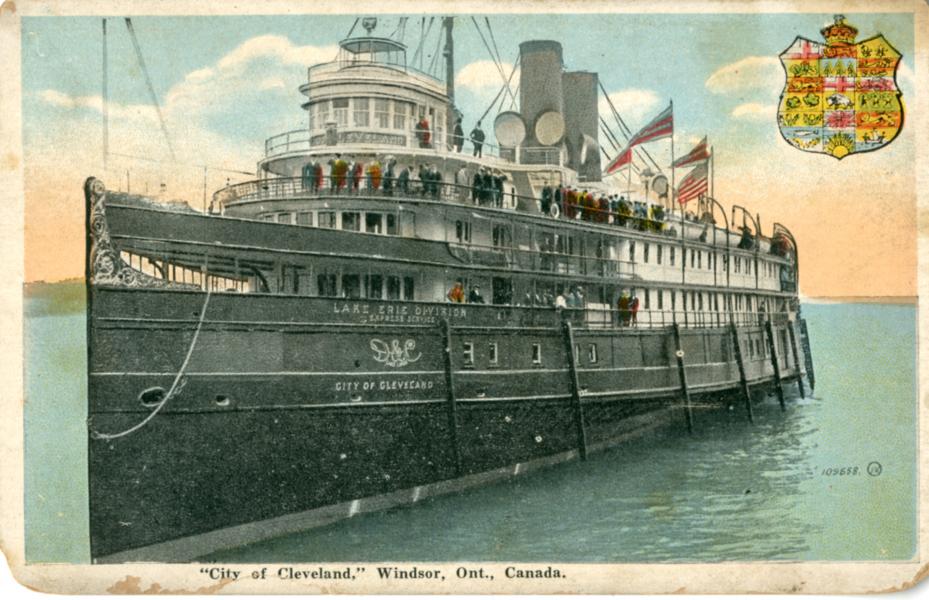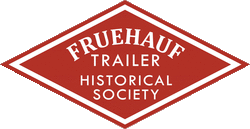Harvey Fruehauf Double-Crosses the Company
Roy Fruehauf, President of Fruehauf Trailer Company
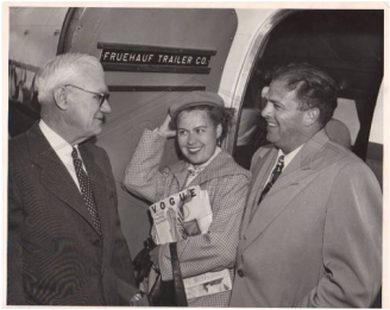 Roy and Ruth Fruehauf board the company plane
Roy and Ruth Fruehauf board the company plane
Roy Fruehauf became the President of Fruehauf Trailer Company in 1949. College educated and younger, he was more eager than his brother
Harry to take over the company. Roy was already Vice President in charge of
Sales when he becomes the new president, after having served Fruehauf Trailer Company for 23 years
in various roles moving up the ladder. Roy
was well liked by his customers and enjoyed traveling around the country to
sales meetings and conventions, entertaining his clients. With his legendary
generosity and natural charm the young executive was a resounding success,
breaking all the company’s sales records.
Newly married to Kentucky beauty, Ruth Horn, the couple dazzled their customers with glamorous events, a stylish lifestyle and good old fashioned down-home fun. Ruth, not a stuffy sorority sister, knew how to have a good time. She incorporated her southern charm and hospitality for company events, client dinners and other social functions that the charismatic couple was required to attend. Practical jokes, cocktail hour and trailer sales were the couple’s mission.
Newly married to Kentucky beauty, Ruth Horn, the couple dazzled their customers with glamorous events, a stylish lifestyle and good old fashioned down-home fun. Ruth, not a stuffy sorority sister, knew how to have a good time. She incorporated her southern charm and hospitality for company events, client dinners and other social functions that the charismatic couple was required to attend. Practical jokes, cocktail hour and trailer sales were the couple’s mission.
Differences develop between
Harvey and Roy Fruehauf
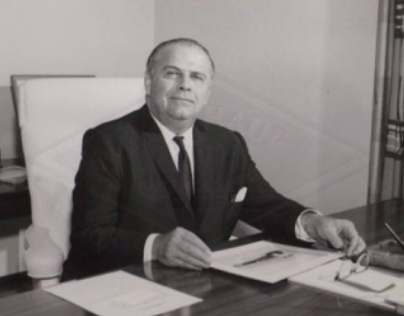 Roy Fruehauf, President of the Fruehauf Trailer Company
Roy Fruehauf, President of the Fruehauf Trailer Company
As Roy began to take charge of Fruehauf, Harvey became more unnerved about his decision to step down from his leadership position. Rather than accept the inevitable differences in their business methods, Harvey questioned, second guessed and interfered with all of Roy’s business strategies and decisions, like an armchair quarterback. Roy a natural risk-taker with an eye to the future disagreed with his brother’s safe and conservative style. Roy felt these restrictions suffocated the company’s growth. There are numerous memos, letters and reports documenting Harvey's interference with staff, the executive team and the board of Fruehauf. This could cause dissension, doubt and confusion, however Roy who had worked his way up through the rank and file of the company was well-liked and respected. It turns out many agreed with Roy's strategies.
Roy’s records contain a transcript of a September 10, 1953 meeting with Ben Young, an employee of the National Bank of Detroit.
While much of the discussion is in regard to banking business, several other matters are covered during this meeting. Roy is extremely concerned about the health of his company treasurer Elmer Gove who is currently in hospital. Roy gets Young’s advice on how to find someone who can ease the accounting workload on Gove, without hurting his pride. Roy acknowledges that Gove’s ill health and hospitalization are caused by the burden that Harvey placed on Elmer to divulge company confidentialities. Elmer’s conflict of loyalty to both of the brothers is so great that he suffered to the point of destruction causing hospitalization.
In a rare moment Roy makes a statement regarding his feelings about his brother’s behavior as well as his management style.
“I’ve been kicked around so much in my life and hurt so many times that I lean over backwards not to hurt anybody else. That might be the reason. This place used to be electrified when Harvey was around here. When he would walk in, everybody was scared of their shadows. That’s no way to run a place in my estimation,” Roy exclaims in his conversation with the banker.
Roy discovered that he had unexpected allies on his side. Many agreed with Roy's vision for the company and felt that Harvey represented an era which was now obsolete. A growing bitterness festered for nearly four years.
Roy’s records contain a transcript of a September 10, 1953 meeting with Ben Young, an employee of the National Bank of Detroit.
While much of the discussion is in regard to banking business, several other matters are covered during this meeting. Roy is extremely concerned about the health of his company treasurer Elmer Gove who is currently in hospital. Roy gets Young’s advice on how to find someone who can ease the accounting workload on Gove, without hurting his pride. Roy acknowledges that Gove’s ill health and hospitalization are caused by the burden that Harvey placed on Elmer to divulge company confidentialities. Elmer’s conflict of loyalty to both of the brothers is so great that he suffered to the point of destruction causing hospitalization.
In a rare moment Roy makes a statement regarding his feelings about his brother’s behavior as well as his management style.
“I’ve been kicked around so much in my life and hurt so many times that I lean over backwards not to hurt anybody else. That might be the reason. This place used to be electrified when Harvey was around here. When he would walk in, everybody was scared of their shadows. That’s no way to run a place in my estimation,” Roy exclaims in his conversation with the banker.
Roy discovered that he had unexpected allies on his side. Many agreed with Roy's vision for the company and felt that Harvey represented an era which was now obsolete. A growing bitterness festered for nearly four years.
Drew Pearson |
Ambassador Joe Davies |
Alphons Landa |
|
The Washington Merry-Go-Round was a famous syndicated column across the country. Fruehauf was featured often...
|
Ambassador to Russia before WWII, Davies plays a key role in the Fruehauf Trailer Company.....
|
Board member and Washington Lawyer, Alphons Landa was a brilliant corporate legal mind of the time......
|
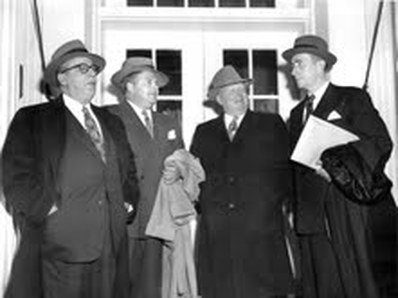 Burge Seymour, Roy Fruehauf, Dave Beck and Art Condon at an A.C.T meeting at the White House
Burge Seymour, Roy Fruehauf, Dave Beck and Art Condon at an A.C.T meeting at the White House
During those early years as president of the company, Roy begins to gather friends and business associates as advisors. Alfonso Howard Beaumont Landa, a well-known attorney and corporate raider, happened to be on retainer to the trailer company for assorted legal matters. Landa, hired by Harvey, was a man of many skills and becomes a trusted friend and advisor. Coincidentally, it was Landa's expertise in corporate legal struggles that ultimately saved the company and defeated Harvey.
Another important friendship was developed with Joseph E. Davies, Ambassador to the Soviet Union, and personal friend to an assortment of U.S. Presidents over a span of more than half a century. Davies extends that friendship to Roy, despite their age difference. There is frequent correspondence between Davies and Roy showing the deep affection and regard they had for each other.
Both Alphons Landa and Joseph Davies attended the intimate and small wedding of Roy and Ruth Horn in June of 1950.
During this period of great expansion for the company and the ever increasing demands for the young president, Roy had to deal with these interferences from his elder brother. One series of memos details Harvey's demands to use the company plane to fly his family to Florida for their winter vacation. Roy had to call the plane back interrupting one of the executive's business trips for the sole purpose of catering to Harvey who refused to fly commercially.
On May 6, 1952 Harvey’s criticism of Roy’s management reaches a boiling point. Harvey made an ultimatum during a company board meeting loudly sharing his criticism for all present. Two days later Roy wrote Harvey a letter suggesting that it might be a good time for Harvey to retire from Fruehauf, entirely. This event marks the beginning of a cold war between the brothers. During the subsequent year Harvey is conspicuously absent from board meetings, even though he is still chairman of the board in name.
On May 8, 1953, one year after the infamous boardroom ultimatum, Harvey is voted off of the board unanimously and Roy announced to the press that Harvey Fruehauf is retiring from the company. Harvey will heretofore be referred to as the Honorary Chairman of the Board, a title that gives him no real authority.
Nursing a grudge for the summer, Harvey’s subsequent response comes as a shock to Roy and the board, as well as to everybody connected with Fruehauf Trailer Company, stockholders and family alike.
Another important friendship was developed with Joseph E. Davies, Ambassador to the Soviet Union, and personal friend to an assortment of U.S. Presidents over a span of more than half a century. Davies extends that friendship to Roy, despite their age difference. There is frequent correspondence between Davies and Roy showing the deep affection and regard they had for each other.
Both Alphons Landa and Joseph Davies attended the intimate and small wedding of Roy and Ruth Horn in June of 1950.
During this period of great expansion for the company and the ever increasing demands for the young president, Roy had to deal with these interferences from his elder brother. One series of memos details Harvey's demands to use the company plane to fly his family to Florida for their winter vacation. Roy had to call the plane back interrupting one of the executive's business trips for the sole purpose of catering to Harvey who refused to fly commercially.
On May 6, 1952 Harvey’s criticism of Roy’s management reaches a boiling point. Harvey made an ultimatum during a company board meeting loudly sharing his criticism for all present. Two days later Roy wrote Harvey a letter suggesting that it might be a good time for Harvey to retire from Fruehauf, entirely. This event marks the beginning of a cold war between the brothers. During the subsequent year Harvey is conspicuously absent from board meetings, even though he is still chairman of the board in name.
On May 8, 1953, one year after the infamous boardroom ultimatum, Harvey is voted off of the board unanimously and Roy announced to the press that Harvey Fruehauf is retiring from the company. Harvey will heretofore be referred to as the Honorary Chairman of the Board, a title that gives him no real authority.
Nursing a grudge for the summer, Harvey’s subsequent response comes as a shock to Roy and the board, as well as to everybody connected with Fruehauf Trailer Company, stockholders and family alike.
The Double Cross
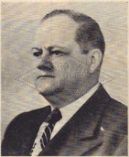 George Kolowich
George Kolowich
On July 17, 1953 newspapers release the story that Harvey C. Fruehauf, former president and current Honorary Chairman of the Board, has sold his entire shareholdings in Fruehauf Trailer Company to unscrupulous corporate raider George J. Kolowich. The stock sale includes every share Harvey owns, and the price he receives is $3 million.
Faced with the prospect of losing the company in a very public proxy battle, Roy gathered all his resources, his friends and business associates, who could help him fight off the Kolowich group. Alfons Landa proved to be a useful partner in the upcoming proxy battle for control of the company, as well as an unexpected and skilled adversary who managed to distract and fend off the Kolowich attack. Among other tactics Landa was skilled at utilizing the press to his own advantage.
Faced with the prospect of losing the company in a very public proxy battle, Roy gathered all his resources, his friends and business associates, who could help him fight off the Kolowich group. Alfons Landa proved to be a useful partner in the upcoming proxy battle for control of the company, as well as an unexpected and skilled adversary who managed to distract and fend off the Kolowich attack. Among other tactics Landa was skilled at utilizing the press to his own advantage.
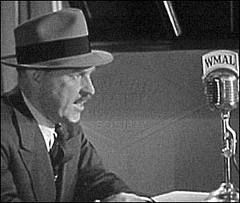 Media personality, Drew Pearson of the Washington Merry-Go-Round
Media personality, Drew Pearson of the Washington Merry-Go-Round
Drew Pearson's Infamous Radio Show The Washington Merry-Go-Round
Covers the Fruehauf Proxy battle
At the peak of his career, over 30 million people read or listened to the muckraking journalist, Drew Pearson. On the verge of a European war, Pearson wrote that Franklin D. Roosevelt "will go down in history as one of the most idealistic Presidents, but with a positive genius for picking second-rate personalities." ["Washington Merry-go-round" September 2, 1939]. Continued.....
Covers the Fruehauf Proxy battle
At the peak of his career, over 30 million people read or listened to the muckraking journalist, Drew Pearson. On the verge of a European war, Pearson wrote that Franklin D. Roosevelt "will go down in history as one of the most idealistic Presidents, but with a positive genius for picking second-rate personalities." ["Washington Merry-go-round" September 2, 1939]. Continued.....
Roy circles the wagons
Roy desperately needed to expand his current holdings of Fruehauf Trailer Company stock, or get promised proxy votes that will give him that controlling share. In his efforts to fight off Kolowich, Roy was supported by the board and family members including Harry, Myrtle and Andrew, none of whom wish for Fruehauf Trailer Company to fall out of family control.
Landa’s strategy against Kolowich was to keep him distracted by using the press and other attacks, permitting them to pursue a backdoor solution. With the aid of Drew Pearson, renowned Washington columnist, and his newspaper reports via the Washington Merry-Go-Round, which is syndicated in Detroit papers too, Kolowich’s reputation was revealed in a series of unflattering articles. Landa employed the services of an investigative leg-man named David Karr who is also a regular employee of Drew Pearson.
While working under cover, Karr dug up dirt on Kolowich, who turned out to be an unsavory and crooked character. One major discovery is that in 1950 Kolowich sold a ship he owned through Detroit and Cleveland Navigation Company. Karr’s research shows that Kolowich bribed certain Senators, as well as Maritime Commission employees, to sell the defunct ship to the government for an exorbitant sum of $2.6 million. In reality the ship was worth $60,000 in scrap.
Kolowich's Tarnished Reputation
David Karr’s investigation also uncovers other interesting details about Kolowich. In 1930 he embezzled $84,000 from the State Bank of America in Hamtramck, Michigan where he was president. He was convicted and served less than two years of a 10 to 20 year prison sentence.
When this unflattering information about Kolowich comes to light in headline news, he tries to save his tarnished reputation. Harvey guilty by association, declares that he did not know Kolowich prior to their recent stock dealings. Karr’s investigation reveals that Harvey’s claims are untrue and indicates that he has sources who confirm that Harvey Fruehauf and Kolowich have known each other dating back to the embezzlement incident. Kolowich and Harvey lived in close proximity in toney Grosse Point and their children attended school together. Other references were discovered later of multiple business dealings between the two men.
Landa’s strategy against Kolowich was to keep him distracted by using the press and other attacks, permitting them to pursue a backdoor solution. With the aid of Drew Pearson, renowned Washington columnist, and his newspaper reports via the Washington Merry-Go-Round, which is syndicated in Detroit papers too, Kolowich’s reputation was revealed in a series of unflattering articles. Landa employed the services of an investigative leg-man named David Karr who is also a regular employee of Drew Pearson.
While working under cover, Karr dug up dirt on Kolowich, who turned out to be an unsavory and crooked character. One major discovery is that in 1950 Kolowich sold a ship he owned through Detroit and Cleveland Navigation Company. Karr’s research shows that Kolowich bribed certain Senators, as well as Maritime Commission employees, to sell the defunct ship to the government for an exorbitant sum of $2.6 million. In reality the ship was worth $60,000 in scrap.
Kolowich's Tarnished Reputation
David Karr’s investigation also uncovers other interesting details about Kolowich. In 1930 he embezzled $84,000 from the State Bank of America in Hamtramck, Michigan where he was president. He was convicted and served less than two years of a 10 to 20 year prison sentence.
When this unflattering information about Kolowich comes to light in headline news, he tries to save his tarnished reputation. Harvey guilty by association, declares that he did not know Kolowich prior to their recent stock dealings. Karr’s investigation reveals that Harvey’s claims are untrue and indicates that he has sources who confirm that Harvey Fruehauf and Kolowich have known each other dating back to the embezzlement incident. Kolowich and Harvey lived in close proximity in toney Grosse Point and their children attended school together. Other references were discovered later of multiple business dealings between the two men.
Dave Beck, President of the Teamster's Union offers to assist Roy
Dave Beck to the Rescue
Roy continues to fulfill his duties for Fruehauf Trailer Company and travels to Washington, DC to attend an ACT committee meeting. Dave Beck, General President of the Teamster’s Union asks Roy about his current business difficulties he has read about in the newspapers in Seattle Washington, Beck’s home town. Roy explains that he is now trying to get funding to purchase a majority interest in Fruehauf stock to stop Kolowich. Beck asks, “Well, why didn’t you call me?”
With the financial assistance provided by the Beck loan, Landa's brilliant strategy to win control of the Fruehauf Trailer Company was achieved.
On April 20, 1954 at the annual shareholders’ meeting at D&C, Roy and Landa win control of D&C and D&C owned Fruehauf Trailer Company stock. Combined with the proxy votes promised to them by other shareholders, Kolowich is dethroned as president, and Landa is voted in as new president of D&C.
Roy continues to fulfill his duties for Fruehauf Trailer Company and travels to Washington, DC to attend an ACT committee meeting. Dave Beck, General President of the Teamster’s Union asks Roy about his current business difficulties he has read about in the newspapers in Seattle Washington, Beck’s home town. Roy explains that he is now trying to get funding to purchase a majority interest in Fruehauf stock to stop Kolowich. Beck asks, “Well, why didn’t you call me?”
With the financial assistance provided by the Beck loan, Landa's brilliant strategy to win control of the Fruehauf Trailer Company was achieved.
On April 20, 1954 at the annual shareholders’ meeting at D&C, Roy and Landa win control of D&C and D&C owned Fruehauf Trailer Company stock. Combined with the proxy votes promised to them by other shareholders, Kolowich is dethroned as president, and Landa is voted in as new president of D&C.
At the May 2, 1954 annual shareholders’ meeting at Fruehauf Trailer Company, Roy wins back full control of his company. The Fruehauf stock held by D&C is now under his control and allows him to vote that stock, thus winning the proxy battle at his own company. This victory is also played out in newspapers throughout the country. Fruehauf Trailer Company is now back in control of family hands but at a huge personal cost for Roy and the intimate members of the Fruehauf family.
Within weeks of Roy’s victory in two boardrooms, Dave Beck approaches him requesting a personal loan of $200,000. Roy, ever grateful to his friend who helped him win back control of Fruehauf Trailer Company, gladly agrees to this loan.
Roy aware of the possible improprieties of such a loan, even though Beck was not at the time in a leadership role with the Teamsters, decided to funnel it through a Fruehauf Trailer Company client. Roy contacted his friend Burge Seymour, President of Associated Transport in New York, to help. Both men would come to regret this transaction.
Within weeks of Roy’s victory in two boardrooms, Dave Beck approaches him requesting a personal loan of $200,000. Roy, ever grateful to his friend who helped him win back control of Fruehauf Trailer Company, gladly agrees to this loan.
Roy aware of the possible improprieties of such a loan, even though Beck was not at the time in a leadership role with the Teamsters, decided to funnel it through a Fruehauf Trailer Company client. Roy contacted his friend Burge Seymour, President of Associated Transport in New York, to help. Both men would come to regret this transaction.

